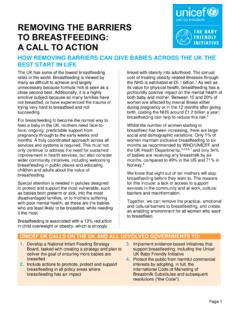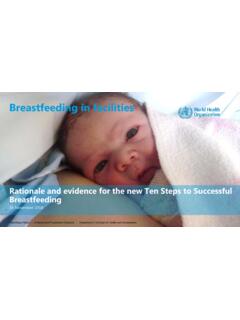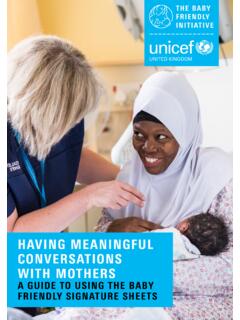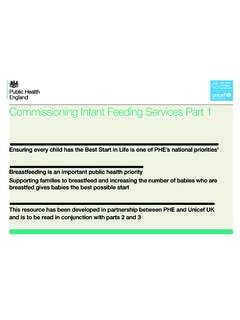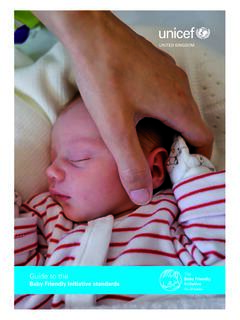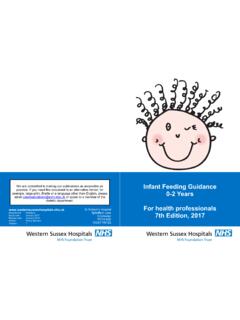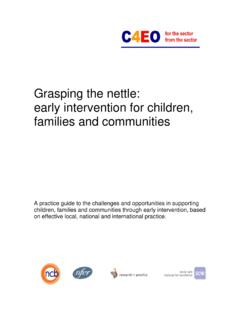Transcription of Guide to the Unicef UK Baby Friendly Initiative Standards
1 THE B ABY. F R I E N D LY. I N I TI AT IVE. Guide TO THE. Unicef UK baby Friendly . Initiative Standards . UN ICEF UK baby FRI ENDLY I NI TI ATI V E : GU I D E TO TH E STA NDA R D S SE C O N D E D I T I O N 1. 2 UN I C E F UK B A B Y F R I E N D LY I N I T I AT I V E : G UI D E TO T HE S TA N DA R D S S E C OND ED IT ION. CONTENTS. INTRODUCTION 4. ABOUT THE baby Friendly Initiative 5. OVERVIEW OF THE Unicef UK. baby Friendly Initiative Standards 7. THE Unicef UK baby Friendly Initiative . Standards WITH GUIDANCE 8. PREPARING TO GO baby Friendly 8. STAGE 1: BUILDING A FIRM FOUNDATION 9. STAGE 2: AN EDUCATED WORKFORCE 11. STAGE 3: PARENTS' EXPERIENCES. OF MATERNITY SERVICES 12. STAGE 3: PARENTS' EXPERIENCES. OF NEONATAL UNITS 16. STAGE 3: PARENTS' EXPERIENCES. OF HEALTH VISITING SERVICES 19. STAGE 3: PARENTS' EXPERIENCES. OF CHILDREN'S CENTRES 22. FULL ACCREDITATION 24. RE-ACCREDITATION 24. ACHIEVING SUSTAINABILITY 25. CONCLUSION 26. UN ICEF UK baby FRI ENDLY I NI TI ATI V E : GU I D E TO TH E STA NDA R D S SE C O N D E D I T I O N 3.
2 INTRODUCTION. Unicef UK /Jennings Welcome to the Guide to the Unicef UK baby Friendly Initiative Standards . This document will Guide you through the staged baby Friendly accreditation programme for maternity, neonatal, health visiting and children's centre The baby Friendly Standards provide a roadmap for These Standards incorporate previous Standards specified you to improve care. Through our staged accreditation in the Ten Steps to Successful Breastfeeding' and Seven programme, services are enabled to support all mothers Point Plan for Sustaining Breastfeeding in the Community'. with feeding and to help parents to build a close and The Standards have been updated and expanded on to loving relationship with their baby . include parent-infant relationships, fully reflecting the evidence base on delivering care and ensuring the best The following chapters will go through each stage of the outcomes for mothers and babies in the UK. accreditation process, detailing how you will know when your service has met the requirements, and how we will Please note, this document does not cover the baby assess the Standards , as well as useful resources for Friendly Standards for universities; for information on these further guidance.
3 And how they are assessed, please see our University Guidance document: Standards . Good luck on your baby Friendly journey. i Or equivalent public health nursing services or early years settings in Wales, Scotland and Northern Ireland. Throughout this document we will use health visiting' and children's centres' to refer to these services. 4 UN I C E F UK B A B Y F R I E N D LY I N I T I AT I V E : G UI D E TO T HE S TA N DA R D S S E C OND ED IT ION. ABOUT THE. baby Friendly Initiative . The baby Friendly Initiative is revolutionising healthcare is based on extensive and resounding evidence that for babies, their mothers and families in the UK, as breastfeeding saves lives, improves health and cuts costs part of a wider global partnership between the World in every country ,2,3,4 It protects children from Health Organization (WHO) and Unicef . We enable a vast range of illnesses including infection, diabetes, public services to better support families with feeding asthma, heart disease and obesity, as well as cot death and developing close, loving parent-infant relationships, (Sudden Infant Death Syndrome).
4 5,6,7 It also protects ensuring that all babies get the best possible start. mothers from breast and ovarian cancers and heart ,9,10,11 In addition, it supports the mother- baby Our staged accreditation programme supports facilities to relationship and the mental health of both baby and improve care by: ,13,14 The benefits are seen in both high and low income countries: a study published in The Lancet in Setting Standards , which provide a roadmap for 2016 found that increasing breastfeeding rates around sustainable improvements the world to near universal levels could prevent 823,000. Providing training and support to help services annual deaths in children younger than five years and implement the Standards and audit their progress 20,000 annual maternal deaths from breast Assessing progress by measuring the skills and Whilst the baby Friendly Initiative 's work is having a positive knowledge of health professionals, and interviewing impact on breastfeeding initiation rates, breastfeeding mothers to hear about their experiences of care.
5 Continuation rates in the UK remain some of the lowest An external Designation Committee of clinicians, in the world. Eight out of ten women stop breastfeeding academics and others with expertise in this field before they want to,16 which is having a serious impact on grants all accreditations and maintains consistency the health and wellbeing of babies and their mothers. across the programme. Many mothers struggle to continue breastfeeding, often The programme helps professionals to provide sensitive due to a lack of consistent breastfeeding support. Also, and effective care and support for mothers, enabling breastfeeding is viewed by many in the UK as largely them to make an informed choice about feeding, unnecessary because formula milk is seen as a close get breastfeeding off to a good start and overcome second best. Advertising of breastmilk substitutes (any any challenges they may face. Thanks to this work, food or drink that replaces breastmilk) is inadequately breastfeeding initiation rates have risen by 20% since regulated, misleading parents and presenting formula the baby Friendly Initiative was established.
6 In addition, feeding as the norm. parents who formula feed are supported to feed their baby as safely and responsively as possible, and all In addition, breastfeeding is a highly emotive subject parents are enabled to develop a close and loving because so many families have not breastfed, or have relationship with their baby . Our Achieving Sustainability experienced the trauma of trying very hard to breastfeed Standards (see page 25) are now supporting services to and not succeeding. The pain felt by so many parents embed this high quality care into practice for the long at any implication that they have not done the best for term: their child can close-down conversation. Whilst no parent should have to feel such pain, the UK context has become Our accreditation programme is recognised and so fraught that those who advocate for breastfeeding risk recommended in numerous government and policy being vilified by the public and in the media. It is time to documents across all four UK nations, including the change the conversation around breastfeeding in the UK, National Institute for Health and Care Excellence and stop laying the blame for the UK's low breastfeeding guidance.
7 baby Friendly accreditation is a nationally rates in the laps of individual mothers. Rather, we need recognised mark of quality care for babies and mothers. to recognise that this is a major public health issue which requires action across government, healthcare and INFANT FEEDING: THE UK CONTEXT community Unicef and WHO recommend exclusive breastfeeding up to six months of age, with continued breastfeeding along Breastfeeding rates in comparable European countries with appropriate complementary foods up to two years show that it is possible to increase rates with a supportive of age and beyond. Our work to support breastfeeding breastfeeding culture and the political will to do so. For UN ICEF UK baby FRI ENDLY I NI TI ATI V E : GU I D E TO TH E STA NDA R D S SE C O N D E D I T I O N 5. example, in the UK only 34% of babies are receiving any In addition, our work around formula feeding protects both breastmilk at six months, whereas in Norway this figure breastfed and formula fed babies from harmful commercial is 71%.
8 18,19 Improving the UK's breastfeeding rates would interests. We seek to ensure that health professionals have a profoundly positive impact on the health and life and parents only receive scientific, unbiased and factual chances of our children, reducing the incidence of and information about breastmilk substitutes, rather than hospitalisations for many short and long-term conditions misleading and often confusing profit-driven marketing. including gastroenteritis, diabetes and obesity, saving We advocate for better regulation around the marketing of many millions for the breastmilk substitutes, and provide information for parents who formula feed on choosing milks and making up feeds. CREATING A NEW NORMAL In these ways, the baby Friendly Initiative is helping to create To breastfeed successfully, mothers require accurate and a new normal in health services, where babies, their evidence-based information, and face-to-face, ongoing, mothers and families are put at the heart of care.
9 Crucially, predictable support across all public services, as well we support health professionals to provide compassionate, as social support in their local The baby non-judgemental and mother-centred support. Friendly Initiative works to ensure that mothers receive this support within healthcare services, and advocates for UK governments to protect these services and take steps FURTHER READING. to improve support beyond the healthcare setting. baby Friendly awards table, showing services'. progress towards accreditation: Whilst supporting breastfeeding is at the heart of the programme, we aim to raise Standards of care for all Benefits of breastfeeding: babies, regardless of how they are fed. For example, in The Evidence and Rationale for the Unicef UK baby Friendly baby Friendly hospitals mothers and babies now routinely Initiative Standards : stay together in the immediate post-birth period, and all Call to Action on infant feeding in the UK: mothers are supported to respond to their baby 's needs for love, care and comfort in a way which promotes close parent-infant relationships and supports the mental health of both baby and mother.
10 REFERENCES. 1 Victora CG, Bahl R, Barros AJD, Franca GVA, Horton S, Krasevec J, 12 Acta Paediatrica (2015) Special Issue: Impact of Breastfeeding Murch S, Sankar MJ, Walker N, Rollins NC (2016) Breastfeeding in on Maternal and Child Health, December, Volume 104, Issue the 21st century: epidemiology, mechanisms, and lifelong effect. The Supplement S467, Pages 1 134. Lancet Series: Breastfeeding 1. Volume 387, No. 10017, p475 490, 13 De Bono E, & Rabe B (2012) Breastfeeding and child cognitive 30 January. outcomes: Evidence from a hospital-based breastfeeding support 2 Acta Paediatrica (2015) Special Issue: Impact of Breastfeeding policy. ISER Working Paper Series: 2012-29 on Maternal and Child Health, December, Volume 104, Issue research/publications/working-papers/ise r/2012-29. Supplement S467, Pages 1 134. 14 Brown A, Rance J, Bennett P (2015) Understanding the relationship 3 Hansen K (2016) Breastfeeding: a smart investment in people and in between breastfeeding and postnatal depression: the role of pain economics, The Lancet.

